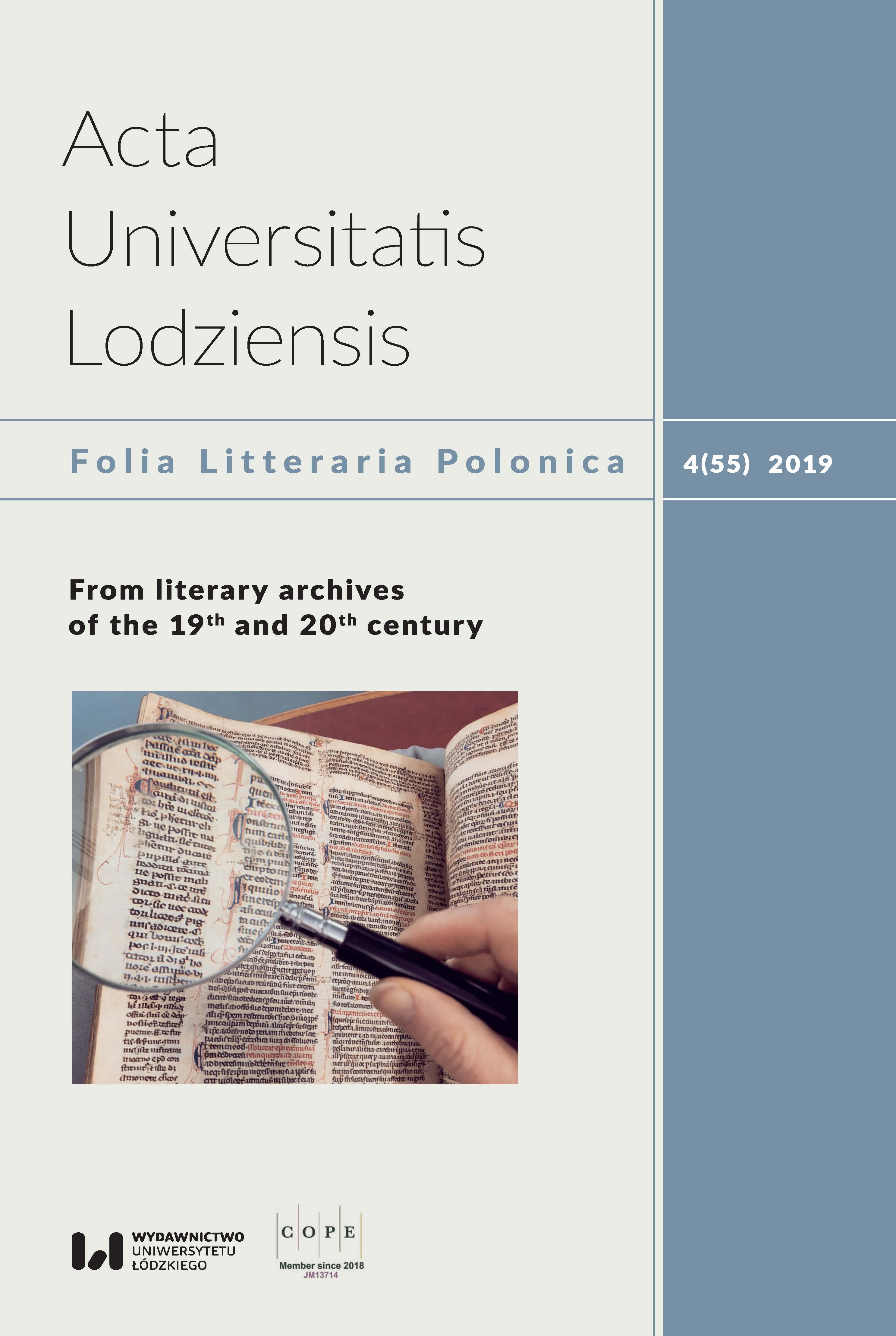The birth of text in the poetic laboratory of Vladimir Aristov: a discrete level model
DOI:
https://doi.org/10.18778/1505-9057.55.12Keywords:
creative history of text, draft, layers, poetry, Vladimir AristovAbstract
In this article, the authors explore the creative method of Vladimir Aristov on the material of two poems with the involvement of the author’s comments and unique manuscripts. All stages of text creation are tracked. The unusual creative thinking of V. Aristov can be called discrete or multi-layered. In fact, each stage of his work on a poem is a separate and autonomous layer, and the creative process itself is presented in the author’s mind as a transition from one level to another. It is shown that each work is created not only in layers, but also in its final version has a multi-level structure, which is clearly reflected by splitting the text into levels using a horizontal dotted line. Finally, layer motifs are also present in the semantics of V. Aristov’s poems (layers of personal memory, layers of history, geological layers, etc.).
Downloads
References
Aristov Vladimir, Mezh dvukh videniy. Stikhi, ‘Novyy mir’ 2018, № 2.
Google Scholar
Aristov Vladimir, Nochnaya iyul’skaya dal’, ‘Znamya’ 2016, № 10, pp. 61–64.
Google Scholar
Bakhtin Mikhail M., Avtor i geroy. K filosofskim osnovam gumanitarnykh nauk, Azbuka, Sankt Peterburg 2000, p. 336.
Google Scholar
Bondi Sergey M., O chtenii rukopisey Pushkina, v: Bondi Sergey M., Chernoviki Pushkina: Stat’i 1930–1970 gg., 2-ye izd., Prosveshcheniye, Moskva 1978, pp. 143–190.
Google Scholar
Larionov Denís, Sosredotochennoye rasseyaniye. Vladimir Aristov. Stat’i i materialy, Knizhnoye obozreniye (ARGO-RISK), Moskva 2017, pp. 20–27.
Google Scholar
Pertsov Nikolay V., Lingvistika, poetika, tekstologiya. Izbr. Stat’i, Yazyki slavyanskoy kul’tury, Moskva 2015, p. 696.
Google Scholar
Piksanov Nikoláy K., Tvorcheskaya istoriya ‘Gorya ot uma’, 2-ye izd., Nauka, Moskva 1971, p. 400.
Google Scholar
Shklovskiy Viktor B., Iskusstvo kak priyem, v: idem, Gamburgskiy schet. Stat’i, vospominaniya, esse (1914–1933), “Sovetskiy pisatel”, Moskva 1990, pp. 17–22.
Google Scholar
Vekshin Georgy V., Semanticheskoye prostranstvo i fonostilistika porozhdeniya liricheskogo teksta (stikhotvoreniya A. Pushkina), v: idem, Fonostilistika teksta: zvukovoy povtor v perspektive smysloobrazovaniya, diss. … d-ra filol. nauk., Moskva 2006, pp. 394–455.
Google Scholar
Vekshin Georgy V., Khomyakova Yekaterina V., Problemy predstavleniya tvorcheskoy istorii proizvedeniya v pechatnykh i elektronnykh izdaniyakh, ‘Izvestiya vuzov: problemy poligrafii i izd. dela’ 2015, № 4, pp. 22–27.
Google Scholar
Vekshin Georgy, Khomyakova Yekaterina, The Videotext Project: Solutions for the New Age of Digital Genetic Reading, Advances in Digital Scholarly Editing. Papers pres. at the DiXiT conferences in The Hague, Cologne, and Antwerp, Ed. by Peter Boot, Anna Cappellotto, et al., Sidestone Press, Leiden 2017, pp. 207–209.
Google Scholar
Vinokur Grigoriy O., Kritika poeticheskogo teksta, Gos. Akademiya khudozh. nauk, Moskva 1927, p. 133.
Google Scholar
Downloads
Published
How to Cite
Issue
Section
License

This work is licensed under a Creative Commons Attribution-NonCommercial-NoDerivatives 4.0 International License.











